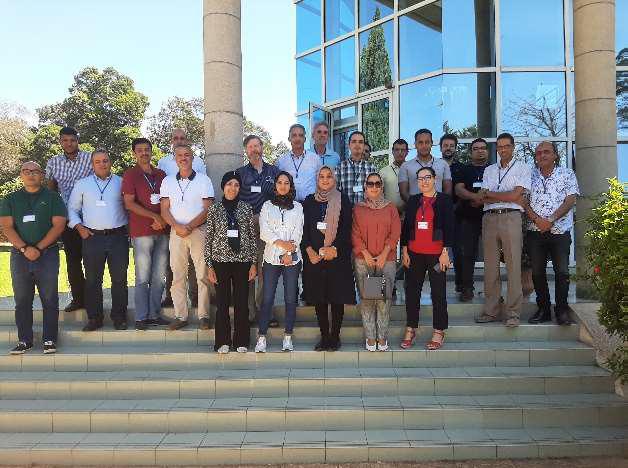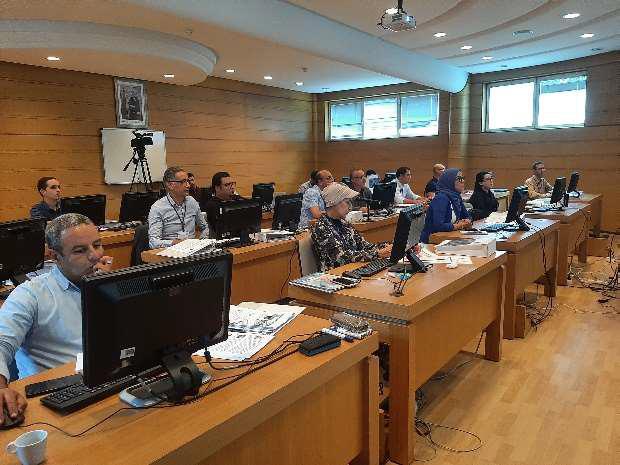
5 minute read
Capacity Building Workshop in Spatial Oceanography: Summary Report
Rabat, Morocco, 12-16 September 2022
For several decades space observation techniques have enabled considerable progress in the analysis and monitoring of oceans. The measurement of hydrography (maritime topography) and its temporal evolution, wave measurements, surface temperature and biological indicators are all information that can now be obtained instantly. All the data collected by meteorological and oceanic observation satellites provide a better description and understanding of oceanic phenomena and contribute significantly to the management of marine risks and resources.
These large amounts of data from Earth observation as well as the simulation and modelling tools available at international and national levels open up an unprecedented avenue for applied research activities whose orientations remain dependent on good knowledge and understanding of the Earth’s environment by national researchers of these data, methods and models used as well as their application to the national context.
Thus, within the framework of the work and activities of the National Committee of Coordination in the fields of Hydrography, Oceanography and Marine Mapping (CNCHOC), the CRTS organized a training workshop for national researchers on the theme of space oceanography and its applications to marine and coastal areas. Two webinars were also organized on the sidelines of the workshop to broaden the audience and benefit more researchers from Moroccan and African universities.
Objectives
This workshop was organized in partnership with COSPAR. It enabled :
- a platform to be developed for exchange between national scientists involved in marine and coastal areas;
- knowledge to be shared on the associated use of space-based remote sensing and in situ data;
- understanding the tools for extracting marine and coastal parameters from satellite images;
- understanding the physical models used for ocean forecasting, integrating satellite images;
- the appropriation of computer tools for visualization, processing, modelling and simulation;
- new data processing methods to be used, such as AI and Deep Learning
Opening Ceremony
The opening ceremony was chaired by Mr. Driss El Hadani, Director of the CRTS in the presence of Mr. Jean Claude Worms, Executive Director of COSPAR and Mr. Gad LEVY, President of PORSEC. Mr. Driss El Hadani insisted in his speech on the importance of the theme of space oceanography at national and regional level and particularly its anchoring in the activities of the National Committee in the fields of Hydrography, Oceanography and Marine Cartography (CNCHOC). He also emphasized the major role of national capacity building of researchers in this field, and the role of international cooperation in technology transfer and training.
Mr. Jean Claude Worms presented the role and the international activities of capacity building within COSPAR while welcoming this second initiative in Morocco, following the one organized in 2005 at CRTS. He also expressed the idea of again supporting a training session in space oceanography in Morocco, extended to the African continent.
Dr. Gad Levy presented PORSEC, an international association in the field of oceanography and was pleased with this first training course in the African continent involving five PORSEC experts.
Presenters
The speakers were scientists and experts specialized in the exploitation of satellite images dedicated to marine and coastal areas, as well as in the design of oceanographic analysis and forecasting systems from seven national and international institutions :
Dr. Abderrahmane Atillah, Centre Royal de Télédétection Spatiale, Morocco.
Dr. Gad Levy, NorthWest Research Associates (NWRA), USA
Dr. Stefano Vignudelli, Consiglio Nazionale delle Ricerche, Italy
Dr. Cara Wilson, NOAA, National Marine Fisheries Service, USA
Dr. Nimit Kumar, Indian National Centre for Ocean Information Services, INCOIS, India
Dr. David Doxaran, Laboratoire d’océanographie de Villefranche, France
Dr. Andrew Geiss, Pacific Northwest National Laboratory, USA.
This workshop was intended for CNCHOC members. The 16 participants were researchers involved in various fields related to the theme of the training, including :
- Physical and operational oceanography
- Automatic detection of ships from satellite radar images using artificial intelligence techniques,
- Bathymetry and classification of the seabed,
- Monitoring the evolution of the coastline,
- Offshore renewable energies,
- Morpho-sedimentary dynamics of coastlines,
Workshop Program
The training workshop was organized in the form of lectures and practical exercises in face-to-face and distance learning formats, structured in five modules :
1- Introduction to space oceanography:
Main space missions for ocean observation; main parameters, products and applications.
2- Operational Oceanography : Modeling - Assimilation - Forecasting
Data assimilation methods; Machine Learning methods; integration of methods into existing global and regional ocean physical analysis and forecasting systems; applications of forecasting methods.
3- Applications to marine resources
Fundamentals and applications of Ocean Colour; exploitation of several databases and services: ERDDAP (NOAA server), NASA Oceancolor portal, INCOIS LAS ...; use of different software : BRAT Toolbox and BEAM for the extraction and production of marine parameters.
4- Applications for marine and coastal hazards
Principle of Radar altimetry; exploitation of several databases and services : SARVATORE GPOD and EarthConsole® Altimetry Virtual Lab from ESA; data processing using Matlab.
5- Applications for coastal ecosystems
Turbidity of coastal waters from satellite observations; methods for estimating biochemical products : turbidity, concentration of suspended solids, organic matter, etc.; use of ACOLITE, SeaDAs, SNAP tools for extraction and production of coastal parameters.
Webinars
A series of two webinars for national and African researchers on the topic of the contribution of space technologies in marine and coastal areas were organized on the sidelines of the workshop according to the program below :
-Applications for marine and coastal risks, with Dr Stefano Vignudelli from National Research Council, Italy.
-Applications for Coastal ecosystems, with Dr. David Doxaran from Laboratoire d’Océanographie de Villefranche, France
162 people registered for these webinars, mostly from Moroccan universities, as well as research institutions in some African countries, including the Democratic Republic of Congo, Senegal, Sierra Leone, Gambia, Togo, and Tunisia. All participants received the presentation materials.
Opportunities for collaboration
1- proposal to organize the biannual PORSEC conference for 2024 in Morocco. During the same period, a training activity for researchers in the field of space oceanography. Contact : Dr Gad Levy.
2- COSPAR : proposal to organize jointly with COSPAR a Regional Training Workshop in space oceanography for African researchers. Contact : Jean-Claude Worms.
3- Possibilities of collaboration with the Pacific Northwest National Laboratory (PNNL), one of the national laboratories of the US Department of Energy, Richland, Washington, on : clouds and aerosols, atmospheric convection, climate modelling, and the Atmospheric Radiation Measure-ments (ARM) program. Contact : Dr. Andrew Geiss.
4. Opportunities for collaboration in NOAA/NESDIS (National Environmental Satellite, Data, and Information Service) projects, particularly on capacity building aspects. Contact : Dr. Cara Wilson.
5- Possibility of collaboration in the framework of the FULLBRIGHT and POGO/SCOR (Partnership for Observation of the Global Ocean and Scientific Committee on Oceanic Research (SCOR)) for scholarships and provision of experts. Contacts : Dr. Gad Levy and Dr. Cara Wilson.
6- Potential collaboration with INCOIS for technology transfer and training in oceanography.
Evaluation
- The training was very well perceived by the participants, who were able to understand the fundamentals of space oceanography and its applications, to practise on open source tools and access to databases and services on an international scale. Other topics of specific interest for future training were mentioned :

- Processing, extraction and analysis of Earth observation data
- Machine Learning
- Radar data processing and marine and coastal applications
- Bathymetry





